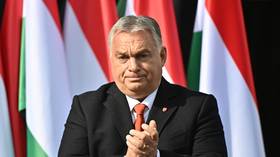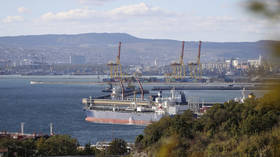
Brussels should focus on “surviving” the energy crisis, Prime Minister Viktor Orban says

Hungarian Prime Minister Viktor Orban at an event in Zalaegerszeg, Hungary, October 23, 2022. © Attila Kisbenedek / AFP
The EU must change its sanctions policies because it is suffering far more than the US amid the conflict in Ukraine, Hungarian Prime Minister Viktor Orban has said.
His statement came after French President Emmanuel Macron told CBS News’ ‘60 Minutes’ on Sunday that there is “a big gap” in how the crisis is affecting the US and EU, as the European bloc’s member states rely on foreign oil and gas supplies, while Washington is a fossil fuel producer.
“President Emmanuel Macron is right: The cost of the Russia-Ukraine war is not the same on both sides of the Atlantic,” Orban tweeted on Monday.
“If we want European industry to survive, we must address the European energy crisis swiftly. It’s high time to re-evaluate sanctions.”
After Russia launched its military operation in Ukraine in late February, Western countries and their allies imposed sweeping sanctions on Moscow’s energy exports, including a price cap on seaborne oil deliveries, which took effect on Monday.

Read more
Hungary, whose economy depends heavily on Russian energy, received some exemptions from the EU’s embargo. Nevertheless, Budapest has warned of greater negative side effects for the bloc from the sanctions on Moscow. Orban said in July that the EU has “shot itself in the lungs.”
Officials in Budapest have argued that Brussels should focus on reaching peace between Russia and Ukraine. Hungary broke ranks with other Western countries by refusing to send weapons to Kiev or train Ukrainian troops.
Moscow has repeatedly said it will not sell oil to nations that impose a price cap. “We will sell oil and oil products only to countries that will work with us on the basis of market conditions, even if we have to lower production,” Deputy Prime Minister Aleksandr Novak said on Sunday. Kremlin spokesman Dmitry Peskov said that Moscow is preparing an official response to the oil price cap.




